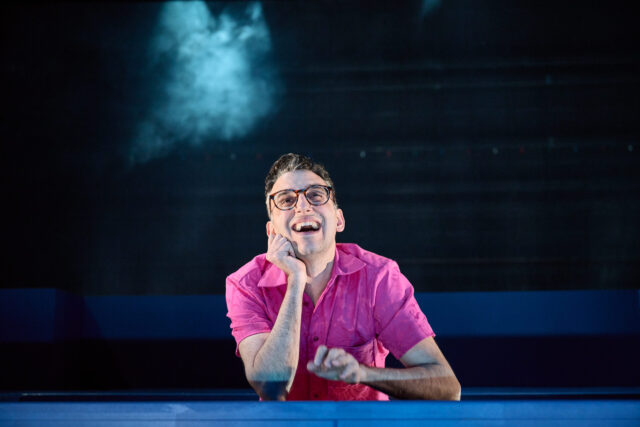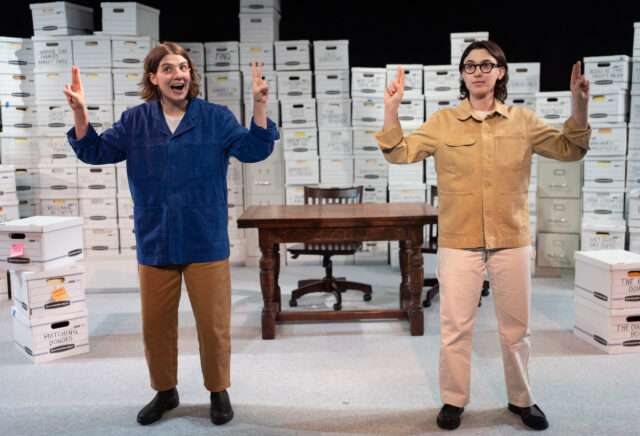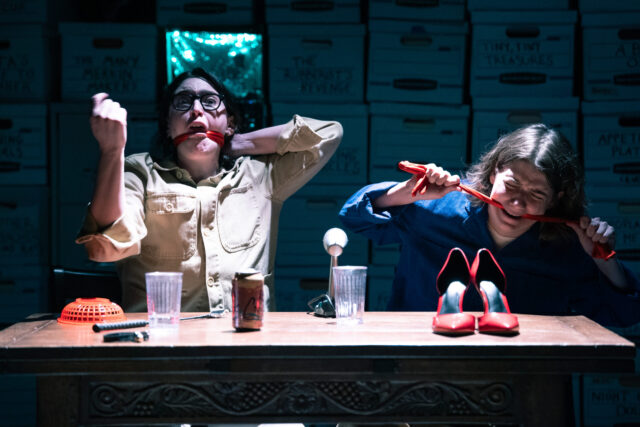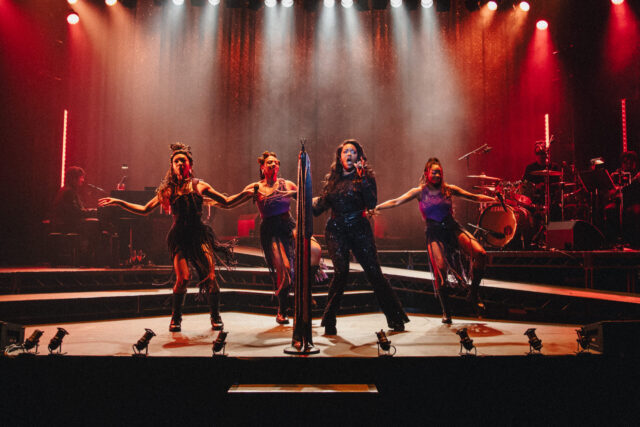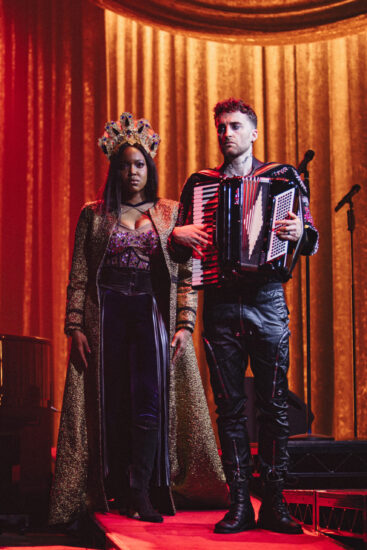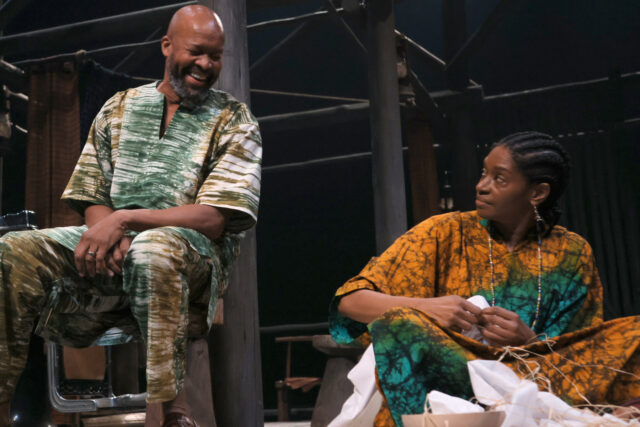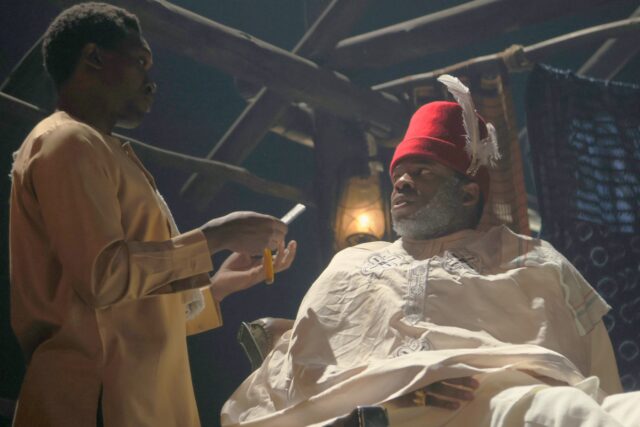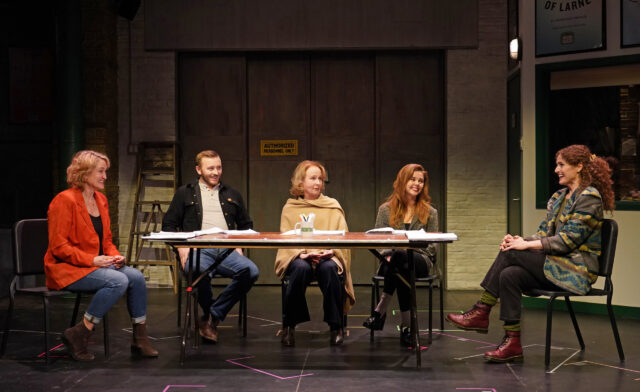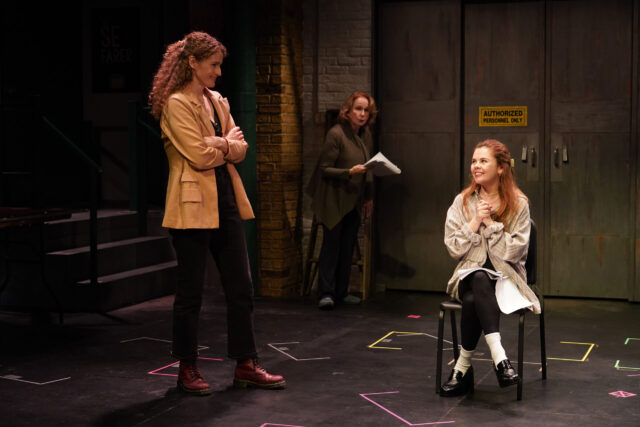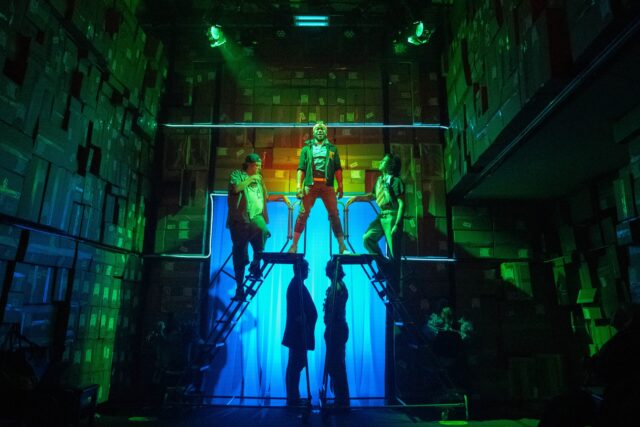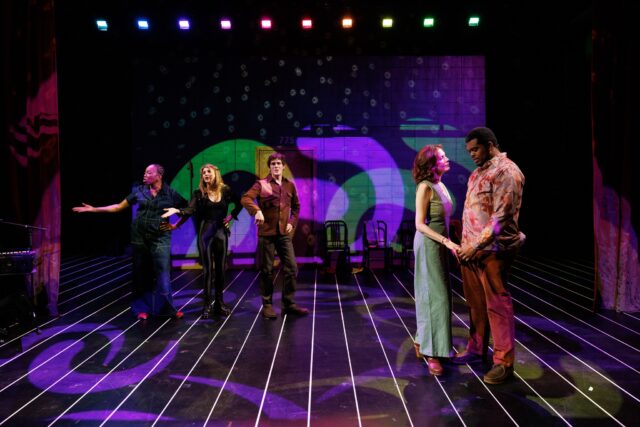
Five actors portray multiple characters in Neena Beber’s Brecht adaptation at BAC (photo by Maria Baranova)
A MOTHER
Baryshnikov Arts Center, Jerome Robbins Theater
450 West 37th St. between Ninth & Tenth Aves.
March 29 – April 13, $59-$79
www.bacnyc.org
There was already a palpable buzz at the Baryshnikov Arts Center on April 7, opening night of Neena Beber’s Brecht adaptation, A Mother, before several Jessicas arrived: Jessica Hecht, who co-conceived the show and was about to step onstage in her starring role as Pelagea Vlassova, and a resplendent Jessica Lange in the audience, who raised the event’s already high-glamour quotient. Lange, who has won three Emmys, two Oscars, and a Tony, has portrayed several memorable mothers onstage during her long career, including Phyllis in Paula Vogel’s Mother Play last year and Mary Tyrone in Jonathan Kent’s 2016 production of Eugene O’Neill’s Long Day’s Journey into Night, was there not just as a fan of Brechtian epic theater but also because Shura Baryshnikov, her daughter with BAC founding artistic director Mikhail Baryshnikov, is the show’s choreographer.
Brecht’s 1932 play, the full title of which is The Mother: The Life of the Revolutionary Pelagea Vlassova from Tver, is based on Maxim Gorky’s 1906 novel known alternately as The Mother and, more simply, Mother. Beber and her co-creator, Emmy and Tony nominee Jessica Hecht, have changed the title to A Mother, which gives it more of a universal feel. They have also updated the setting; the action takes place in 1917 Russia, 1979 Miami, and the present.
In Russia, the widow Pelagea Vlassova (Hecht) is worried that her son, Pavel (Fergie Philippe), has fallen in with dangerous revolutionaries Ivan (Portia) and Anton (Zane Pais), who are protesting the treatment of factory workers and are threatening to strike. In Miami, fifteen-year-old Jess (Hecht) is having a blast at JD’s Disco on the beach, where she dances with seventeen-year-old Daryl (Philippe), who she hopes will be her first true love. In the present, she looks back at her life, including the summer she spent at Camp Shalom Aleichem in Barkhamstead, Connecticut, where she learned about Brecht from counselor Michelle (Delilah Napier), who was determined to inject plenty of Brecht into the campers’ production of Lerner and Loewe’s 1951 musical, Paint Your Wagon.
Michelle is wrapped up in her own Brechtian world view. “Who cares what you see yourself as? Identification is the lowest form of appreciation!” she tells one camper. She advises another, “Play the opposite. Think the opposite. Do the opposite.” And she declares, “Everything artificial is less artificial if you acknowledge that it’s artificial. The best way to be real when you are doing a play is to be fake.”
That’s precisely how Beber, director Maria Mileaf, set designer Neil Patel, costumer Katherine Roth, choreographer Shura Baryshnikov, lighting designer Matthew Richards, and the cast of five approach A Mother. Their production regularly reminds us that we are in a theater watching a fictional show in 2025, from their use of Brecht curtains to Jess’s interactions with the audience and clever dialogue.
“I don’t care what they say, disco is never gonna die,” Daryl insists. One of the other clubgoers (Napier) explains, “Born in the clubs frequented primarily by gay and African-American and Latino fans in opposition to the dominant social structures!” Social structures involving race and injustice come to the fore when the narrative shifts to the real-life murder of Black insurance salesman and Marine Arthur Lee McDuffie at the hands of police officers, leading to the 1980 Miami riots. In one of the most poignant moments of the play, Arthur’s mother, Eula Bell McDuffie (Portia), sings the elegiac African American spiritual “Wade in the Water” (the tune of which Jess transforms into the Mourner’s Kaddish).
As per Brecht’s instructions for this “learning play,” music is a key contributor, with songs ranging from Lipps Inc.’s “Funkytown” and “Wade in the Water” to compositions by Mustapha Khan, William Kenneth Vaughan, and Norman (Skip) Burns. Among the new tunes are “Time to Fight” (“Take it to the street”), “Our Spot Is Desperate” (“Things can’t go on this way”), and “Let’s Make It Strange” (“You can melt gold to re-form / into shapes not quite born / with the fire of dialectical materiality”). As Michelle points out, “Think about that Brecht said: ‘Will there be singing in dark times? Yes, there will be singing, about the dark times.’”
Slyly referencing the Brecht-Gorky connection, the facade of the house at the back of the set features the number 775, a reference to Brecht’s 775th poem, “Stormbird,” which was inspired by Gorky’s “The Song of the Stormy Petrel.”
A Mother is a fun, thoroughly entertaining hundred-minute romp that maybe would have had even Brecht disco dancing at the end. “The aim was to teach certain forms of political struggle to the audience,” Brecht wrote in 1933 about the show. At the end of this production, Jess relates how copies of Brecht’s play were burned by the Nazis, then strolls through pieces of history on her way to today.
“I thought things would be different by now but dark times, dark times keep coming,” she says before reminding everyone about the hope — and revolutionary struggle — that is at the heart of epic theater.
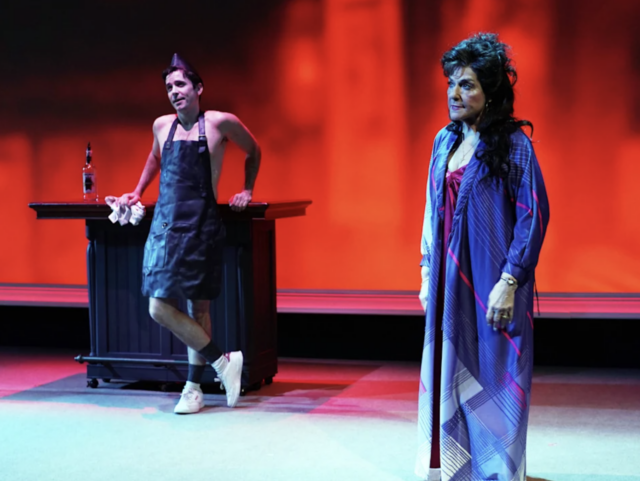
Matt Doyle and Caroline Aaron star as son and mother in semiautobiographical play (photo by Carol Rosegg)
CONVERSATIONS WITH MOTHER
Theatre 555
555 West Forty-Second St. between Tenth & Eleventh Aves.
Wednesday – Monday through April 21, $67-$169
conversationsplay.com
Matthew Lombardo’s Conversations with Mother began life about a decade ago as a series of Facebook posts detailing verbatim phone calls the playwright had with his mother. He eventually decided to turn the daily talks into the semiautobiographical show, which closes April 21 at Theatre 555. (It had been scheduled to run through May 11.)
The play traces the relationship between Maria Collavechio (Caroline Aaron) and her son, Bobby (Matt Doyle), starting in Connecticut in 1966, when she is thirty-seven and he is eight. Bobby desperately wants to come home from sleepaway camp, and Maria says absolutely not — until he writes to her, “Dear Mom: One of the camp counselors asked me to stay with him in his van overnight. He has strawberry Charleston Chews, clicker clackers, and eyeglasses that have real X-ray vision. Can I stay with him some night? Love, Bobby.”
For the next forty years, Bobby keeps getting into trouble, refusing to follow his mother’s sage advice, as he moves to New York and falls in love with an abusive man. Often when admitting his bad choices to her, he asks if she’s mad, and when she says no, he adds, “Good. Cause there’s more.” The strong-willed Maria is not angry as much as disappointed that the tender and insecure Bobby cannot find himself a better life; she believes he is wasting his youth and his chances; he deserves more but won’t believe that. The problem never was that Bobby is gay — Maria embraces that from when he first comes out to her — but that Bobby keeps screwing up, both personally and professionally. And it gets tiring, for her and, unfortunately, the audience.
The play is told in such chapters as “Tell Me The Truth and I Won’t Get Mad,” “Why Can’t You Ever Meet a Nice Boy?,” and “If Your Phone Doesn’t Ring, It’s Me,” as Maria and Bobby go through good times and bad. Even as Bobby starts his career as a playwright, he is unable to enjoy it. He explains, “I’m just so tired. I don’t want to be hurt. I don’t want to be happy. I don’t want to be sad. I don’t want to be sorry. I don’t want to think. I don’t want to know. I just want to be numb.” Maria responds, “I don’t know what to do with you, Bobby. I really don’t know what else to do. I gave you everything. More than all the other kids combined. I gave you things in me I didn’t even know I had. And for what? So you can bitch about your shitty life? No one has a better life than you!”
The narrative takes a turn when Maria becomes ill, leading to a head-scratchingly melodramatic ending that seems to come out of nowhere.
Directed by Noah Himmelstein (The Lucky Star, Los Otros), Conversations with Mother takes place on Wilson Chin’s framed set, where various chairs, bars, and tables are wheeled on and off and props are hidden in the walls. Ryan Park outfits Aaron in fanciful dresses while Doyle wears camp T-shirts with a silly hat, a revealing apron with a silly hat, a hoodie, and eventually more grown-up clothing.
Aaron (Madwomen of the West, A Kid Like Jake) and Tony winner Doyle (Company, A Clockwork Orange) never quite connect; the characters feel like caricatures trapped in a repetitive circle that is hard for the audience to become engaged in. Lombardo, whose previous plays include Tea at Five about Katharine Hepburn and Looped about Tallulah Bankhead, doesn’t develop enough depth; perhaps he’s too close to the material.
At the conclusion of the eighty-five-minute play, you’re likely to think, thank goodness there’s not more.
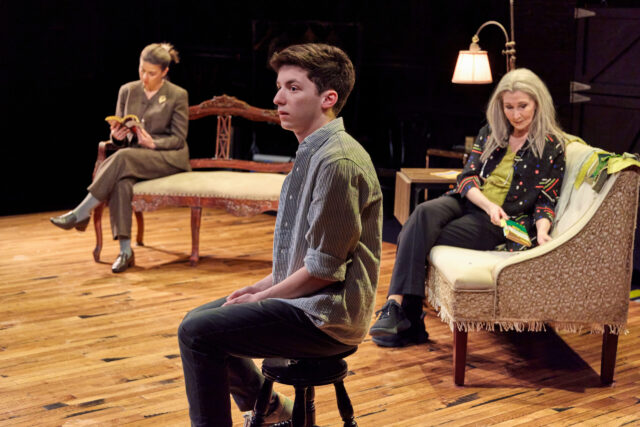
Jeanine Serralles, Andrew Barth Feldman, and Joanna Gleason star as three generations of a Jewish family in New York in We Had a World (photo by Jeremy Daniel)
WE HAD A WORLD
New York City Center Stage II
131 West Fifty-Fifth St. between Sixth & Seventh Aves.
Tuesday – Sunday through May 11, 4160
www.manhattantheatreclub.com
www.nycitycenter.org
New York City native Joshua Harmon is a master at writing about families, specifically Jewish ones, as evidenced by such works as Bad Jews, Skintight, and the epic Prayer for the French Republic. He turns his focus on his own clan in the beautifully told We Had a World, exploring his relationship with his mother and grandmother — and their complicated relationship with each other.
The hundred-minute play begins with Joshua (Andrew Barth Feldman) receiving a phone call from his grandmother, Renee (Joanna Gleason), whom he calls Nana, telling him that his next play should be about the estrangement between his mother, Ellen (Jeanine Serralles), and his aunt, the unseen Susan, focusing on a problematic Passover Seder — and that it should be called Battle of the Titans.
“I have — always wanted to write about our family; I didn’t know if — I had your permission?” he says. She gives him her blessing while making him promise that it will be “as bitter and vitriolic as possible. . . . You can even make your grandmother a real Medea. It ought to be a real humdinger.”
We Had a World is indeed bitter and vitriolic, and a real humdinger, but not in the way the fictionalized Joshua imagined; it is also sweetly innocent, tender-hearted, and almost too honest.
The story ranges from 1988, when Joshua is five, to 2018, when ninety-four-year-old Renee is sick. During his early years, Renee introduces Joshua to the arts, taking him to the R-rated Dances with Wolves, a Robert Mapplethorpe show, an exhibit featuring Tom Friedman’s Soap (which has a pubic hair on it), and the 1994 Broadway production of Medea starring Diana Rigg, an adaptation of the Greek tragedy in which a mother brutally murders her children.
“I don’t think my Mom would ever kill me,” Josh wonders.
“No, I don’t suppose she would,” Renee answers.
“Would you ever kill your children?” he asks.
“It would depend on the situation,” she responds.
Among the other cultural references are E. L. Konigsburg’s From the Mixed-Up Files of Mrs. Basil E. Frankweiler, Anthony Minghella’s The English Patient, and Alan Paton’s Cry, the Beloved Country.
Over time, however, Joshua learns some hard truths about his grandmother while coming to understand his mother in a much more profound way.
Tony-nominated director Trip Cullman (Cult of Love, Significant Other) artfully guides the action on John Lee Beatty’s open set, the audience on three sides, practically in the characters’ laps; you’ll want to try out Renee’s two Parisian high-backed love seats covered in pale green silk, an important plot point, but don’t.
In her return to the stage after a self-imposed twelve-year absence, Tony winner Gleason (Into the Woods, Dirty Rotten Scoundrels) is luminous as Renee, who is not quite the heroic figure Joshua initially thought she was, while two-time Drama Desk nominee Serralles (Dying for It, Gloria) vividly captures the complexities of the more heroic Ellen.
The immensely likable Feldman (Dear Evan Hansen, Little Shop of Horrors) ably navigates between eras as he also serves as the narrator, sharing information directly with the audience. “Before I can take you to Nana’s apartment, you probably want to know a few things. Like why my aunt and mother don’t want to be in the same room. But giving you the sixty-five-year blow by blow of that relationship would . . . we only have one play, so . . . just take my word,” he says near the beginning. “But first — a small family drama? There’s going to be enough ugly stuff.”
Given Harmon’s track record, it’s easy to take his word, especially if there are more wonderfully intricate family dramas in his and our future. (Meanwhile, Passover is right around the corner.)
[Mark Rifkin is a Brooklyn-born, Manhattan-based writer and editor; you can follow him on Substack here.]
